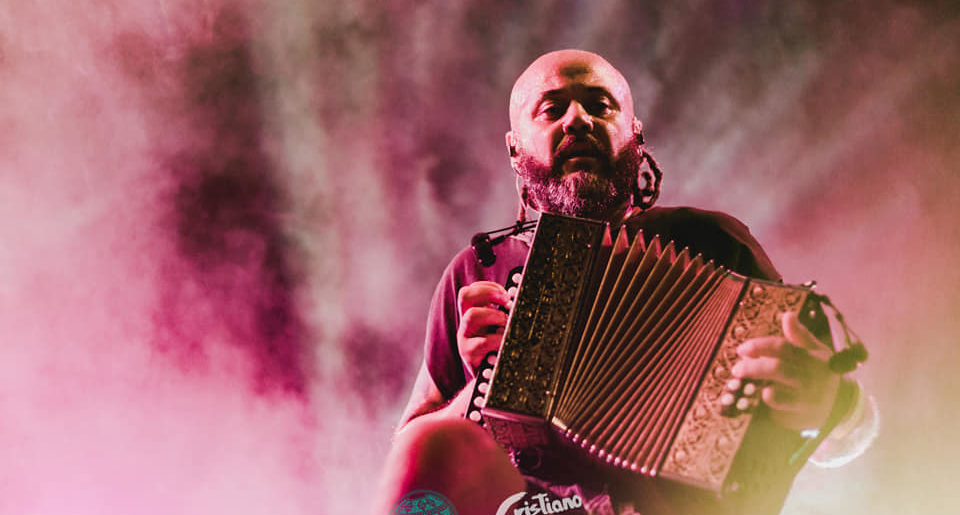
Music
Scuru Fitchadu Take On The Politics Of Art At The Atlantic Music Expo
What begun as an avenue to explore what two very divergent worlds could sound, look and feel like together to Portugal-based, Angolan and Cape Verdean artist Marcus Veiga, has since emerged a unique sound which meshes traditional Funana music and contemporary electronic punk music to what is today known as Scuru Fitchadu.

Drawing inspiration from his diverse cultural upbringing during the 80’s and 90’s, his family having fled the war in Cape Verde exposed Marcus to a unique cultural setting as he navigated understanding his Africanness as well as settling and living as a minority in Lisbon’s neighborhoods. Family traditions like weekend gatherings kept him grounded by his Cape Verdean roots and were instrumental to him identifying with and nurturing a special appreciation for the indigenous Funana sound, which can be categorized as dance music. Moreover, being a minority in his Lisbon neighborhood pushed him out of his comfort zone, and through his peers was introduced to electronic, punk and rock sounds which he also grew to enjoy and regularly consume. 20 years later, these two cultural spheres have slowly been merged from his childhood home, to studios, official music releases and global stages as the product of what his two worlds sound like in tandem.

“Music is a source where meaning can be found, it is much more than an aesthetic,” he explains when asked what his intention behind his music, lyrics and the overall Scuru Fitchadu identity. All over the internet and among his listeners, heavy and very nuanced topics which many shy away from like pan-Africanism, Afrofuturism, liberation and revolution have often been used to describe the message and intention behind the Scuru Fitchadu sound. Growing up as part of a black and African minority, black consciousness and pan-african consciousness have taken center stage in his music. On the other hand, such political and rooted art has been growing in popularity, leading to a whole other conversation encompassing the thin line separating consciousness and aesthetics. My music is uncompromised and political because I believe there’s no non-political art. You can be artsy and political. Pan-africanism is not clothing, a hairstyle, a tattoo or a photo. It’s way deeper than that! If we continue to dilute these topics to aesthetics, we will reduce our music to pop trends.”
Consequently, the vast meaning of his music has been inspired by several revolutions led in Africa and by the black communities around the world, making special reference to the DRC’s Patrice Lumumba, Burkina Faso’s Thomas Sankara and the Black Panther Movement during the Civil Rights era in the USA. With the increasingly blurry line between black aesthetics and meaningful, impactful music, Marcus urges African creatives to dig deeper and see the bigger picture beyond aesthetics and staying relevant. With Scuru Fitchadu’s African influence and commitment to the continent’s growth and liberation, it was interesting to see where Marcus saw the trajectory of the African creative industry heading in the next few years considering the great strides that it has made thus far.

“For the African creative industry to grow, we need to invest in ourselves and where there seems to be no room, we need to create spaces for ourselves. As Africans, we have all the potential, talent and manpower to shape this industry into what we desire it to be,” continues Marcus. In another unique perspective, Marcus also highlighted how the future of the creative industry does not need to be compared to other western creative industries. As he so brilliantly puts it, “ we do not have to compare our cultural revolution and evolution to other cultures in the world.” Despite the heavy cultural influence from Funana music that the Scuru Fitchadu sound has, Marcus shares his experience with the initial reception of his music back in Cape Verde when he released his first single ‘Ken ki Fra?’ in 2016. “Cape Verdeans are very conservative people and very protective of their culture,” he explains, as he continues to share the hesitant approach Scuru Fitchadu was initially met with. “Many did not know that I have Cape Verdean heritage even though I was brought up in Portugal, and so many thought it was cultural appropriation – mostly because of how unfamiliar they were with the electronic and punk sounds. But as people continue to understand my identity and the intent behind my music the reception towards Scuru Fitchadu has been much warmer. I even had the honor of being invited to the Atlantic Music Exp concert hosted in Cape Verde where attendees enjoyed the heavier sound of my music.”

His latest album released in January 2020, ‘Un Kuza Runhu’ which translates to ‘A Bad Thing’ has received positive critiques and has been described as fresh and necessary by some. When asked about the inspiration behind this project, Marcus described this album as a journey through his identity struggle – feeling unaccepted in Portugal whilst also feeling very distant from his African identity and the consequent emotional struggle born of this.
“It is a conceptual album that tells a story… it’s angry and revolutionary music. My content cannot be whispered or ‘polite’. It is heavy, it has to kick down doors.”
Get The Latest
Signup for the AFROPUNK newsletter



